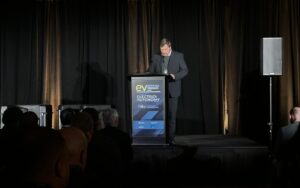Speaking at Electric Autonomy’s EV Innovation & Technology Conference, Robert Weggässer, interim CFO at the VW St. Thomas battery gigafactory, shared updates on the project’s big year ahead

Volkswagen-PowerCo is on track to start construction and begin scouting suppliers for its $20-billion battery cell factory in St. Thomas, Ont., this year. Photo: Electric Autonomy
Speaking at Electric Autonomy‘s EV Innovation & Technology Conference, Robert Weggässer, interim CFO at the VW St. Thomas battery gigafactory, shared updates on the project’s big year ahead
Volkswagen-PowerCo is ready to start construction and scout suppliers for its $20-billion battery cell factory in St. Thomas, Ont., this year.
Robert Weggässer, senior director of finance and interim chief financial officer of the VW St. Thomas gigafactory, gave the update at Electric Autonomy‘s EV & Innovation Technology Conference this month. Volkswagen’s factory is being constructed by its battery subsidiary PowerCo SE.
During a keynote speech, Weggässer gave insights into Volkswagen’s vision for supply chain enhancement and plans for integration into Canada’s regional and national EV industry ecosystem.
To do this the automaker-turned-battery-maker will be hosting multiple supplier days in St. Thomas to secure partnerships for the gigafactory. The first one, said Weggässer, will be “in the second half of 2024.”
“PowerCo is focusing on the entire value chain…[including] investments into mining and chemical processing. PowerCo is also focusing on securing equipment production capacity as well as the complete supply chain for the battery components.”
Additionally, PowerCo is actively working on process technology innovations aimed at reducing production and energy consumption. The battery company is also leading a research team to develop battery recycling for a closed material loop ecosystem, said Weggässer.
Commitment to sustainability and business strategy
There are currently 25 employees at the temporary office in St. Thomas. The gigafactory will employ around 3,000 workers by 2027.
(“I promised my HR that I will use every opportunity to inform you that we are still hiring,” joked Weggässer.)
But kidding aside, to meet its Q1 2027 production start date the factory will need to scale quickly. The key to doing that, said Weggässer, is working with neighbouring partners and resources.
“At PowerCo, [we have] a strong focus on efficient and cost-optimized cell production,” said Weggässer. “VW group will be better positioned for the massive EV ramp up at the top competitive level.”
Central to Volkswagen’s core strategy and business model are vertical integration, unified cell technology and battery design, gigafactory standards and environmental, social and governance (ESG).
All these factors will assist in a crucial aspect of successfully making batteries and selling EVs: reducing cost.
“The battery is the single most expensive part of the electric car. To be competitive, the cost of batteries needs to reduce by 20 to 30 per cent,” said Weggässer.
With up to $7 billion of its own money going into the St. Thomas factory, Volkswagen wants to ensure the best return on its investment. The means putting the most wallet-friendly EVs on the road in North America — ideally sooner than later.
Site preparation is complete and construction is ready to begin, said Weggässer after showing a video taken recently of the future factory grounds.
“We hope to start this year — spring — and get things going.”












